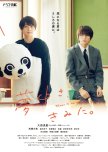
an escape into nostalgia.
It’s a mighty feat adapting any kind of work. There’s always something lost in the translation from one medium into another—the trappings of form too integral to the creation of any piece of media’s spirit. Muchuu sa, Kimi ni is, then, a rare case of an adaptation that not only captures the essence of its source material but almost elevates it.In its original form, Muchuu sa, Kimi ni is a loosely tied together collection of vignettes: one, the tales of Hayashi, a “quirky” high schooler who revels in using his free time to its fullest, attracting companionship along the way; and the tale of Nikaido and Medaka, a “ghostly” outsider with a secret he intends to take to his grave and his classmate who wants to break him out of his shell.
In the drama, these two separate lines are expertly pieced together by director Tsukuhara Ayuko (who knows how to play with the material to shine a light on its best qualities) to craft a pseudo-fantastical narrative that celebrates the wonders of youth and camaraderie in deep vibrancy. Its charm is in its characters (plus their actors—a curated selection of some of the best up-and-comers in the industry) and the quaint little world they exist in. It may be quiet, but it's no less exciting. If you let yourself level with these kids, you'll find their joys and anxieties over the tiny things feel exactly as they should: earth shattering, life changing... but what else would you know when you still have so many years ahead of you?
If there's any gripe to be had, it's that the series ends. Not because things are left unfinished, but rather, because it’s hard to say goodbye. Muchuu sa, Kimi ni offers an escape into nostalgia: for days of youth gone by and freedoms once had, for friendships now lost and ones that could have been if we had let them. Still, it leaves you with a reminder that none of those are ever really out of reach. It's in your hands—you need only make a pitch for it.
Cet avis était-il utile?

The Shipper is a love story, but not in the way you think.
From day one, as people fussed over endgame, what is and isn’t BL, what was appropriate for TV or what wasn’t, I felt something was different about this show. Scratch that—I knew something was different. The writing had something to say, and as I continued to watch the series unfold, what I wanted this show to be didn’t really matter to me anymore. I was simply content to see where the director, Aticha Muilanie (who has proven herself quite adept at injecting narrative with purpose), wanted to take us.The Shipper, at its core, is a humble parable. It’s about trusting in yourself and trusting in others. It’s about learning to forgive and to be forgiven. Growth. Relationships (in and out of them). Love…
The Shipper is a love story, but not in the way you think.
This is a story about what it means to be loved. To understand that, no matter where our place in the grand scheme of things, we are worthy of being loved.
That seed is planted from the very first episode and carried all the way to the very end through all the shenanigans and hijinks that ensue. It will make you laugh, it will make you cry, but most importantly, it will make sure you remember what it has to say.
With its expertly directed cast, excellent use of colour, pleasing camera work, and charming soundtrack, it’s a grounded fantasy that’s hard to say goodbye to. I know I will be coming back to it again and again.
Cet avis était-il utile?

Like Grains of Sand
14 personnes ont trouvé cette critique utile
a masculine sensitivity.
It was Hashiguchi Ryosuke's birthday recently and it reminded me I hadn't seen one of his films before. Given he's a noteworthy filmmaker in modern Japanese queer cinema, I thought I would fix that.Hisaguchi’s preference for long arduous shots often leaves his characters bare naked in scenes—their every motion captured raw for potentially masochistic viewers. It’s awkward, but so is being a teenager, and it’s in this way that the movie really goes for the jugular. These characters are incapable of truly being themselves—they either don’t know how to or are afraid to or both—and after a painful two-thirds of skirting around feelings, everything comes to head in the film’s stunning final act. It’s potentially some of the most captivating 30 minutes ever committed to screen, considering how hard it was to look away. Each shot finds ways to imprint itself more & more into the brain, until it's all taken away.
As an intimate exploration of sexuality—not in the physical, but in the emotional—Hisaguchi has crafted an almost surreal piece of escapism via self-actualization that still manages to resonate some 25 years later. It’s tender, brutal and honest, and kindly asks its audience to be the same. It's not for everybody, but it certainly was for me.
Cet avis était-il utile?

Stripped of most of her agency, Eun Dan Oh decides—screw it. She’ll find love. She’ll find happiness. Whether its her illness or the writer’s set-up, she refuses to let it consume her. She will live. The drama runs forward with this theme in mind, delivering a stellar first act. (If you’re skeptical about starting, make it to the end of episode six and then decide. Kim Hye Yoon is a scene stealer of the highest order.).
The issue is that by the time it gets to say what it wants to say, there’s still another dozen or so episodes to go. So what does it decide to do? It goes in circles. So many circles, in fact, that the ending leaves us right back where we started. Things aren’t derailed, sure, but it’s hard to stay excited when we’ve been here all before.
In conclusion: Extraordinary You is a drama that knew exactly where it was going. It just got there too early and then panicked.
Episodes 1-12 remain TV gold and are well worth the watch. I was never interested in the greater fantasy lore or the mysteries of the universe. What drew me in was Eun Dan Oh. Maybe you’ll find, like me, she’s all the magic you need.
Cet avis était-il utile?

I Will Deliver That Edge
5 personnes ont trouvé cette critique utile
Cette critique peut contenir des spoilers
The Simple Miracle of Human Connection
What are the ties that bind us? What connects two people? Is there really such a thing as fate?In Sono Goen, Otodokeshimasu, Iitoyo Marie is Kuroe Riku, a delivery person for the application Mercari. Every episode is a stand-alone tale based on a true story, each one exploring the simple miracle of human connection: a failed musician and a diehard fan, a marriage on the brink of divorce, a blossoming romance between an artisan and her customer, a mother and her widowed neighbor, an expectant wife and her estranged mother, & lastly, Riku and her adoptive guardian—their chapter unfolding slowly in the background until a pivotal moment arrives that leads it to a close.
Even with Mercari’s presence (it’s part-promotion for the service, after all), the series has a heart. It grapples with human emotion in its rawest state. As Japan does best, things are quiet even as they explode, but it’s a muted affair that feels heavy nonetheless. This careful balance lets each episode stick—though we are with these characters for a short while, you’ll leave them while wondering where they might go.
If nothing else, then watch it just to appreciate its beauty. The whole affair is beautifully shot and directed—striking compositions with vibrant tones meeting believable human portrayals by an impressive cast.
If you’re looking for a simple drama, something that won’t take up your time but won’t waste it either, then it’s worth a chance.
Cet avis était-il utile?

Cet avis était-il utile?

The Aobas' Dining Table
3 personnes ont trouvé cette critique utile
home is where you make it.
Haruko is a well-meaning single mother. Riku is her musically-inclined introvert son. Aiko is Haruko’s candid best friend that lives with them. Sorao is Aiko’s slightly eccentric novelist boyfriend, who also lives with them. The Aobas are not a conventional family by any means, but are family nonetheless.Outside of our homes, we navigate various relationships: with friends, with lovers, with co-workers, with the self. They’re not always easy to deal with, but for the everyday life of the Aoba family, they can come home, sit at the dining table, eat, talk, and be comforted. A meal is not just a meal; it is a gateway to an abstract space—one that is open to conversation, confrontation, and revelation.
For anyone familiar with Matsumoto Soushi’s work, The Aoba’s Dining Table is just as carefully constructed and beautifully shot as his other works. The rhythm is restrained but occasionally explodes with bursts of energy. The muted colors of the outside world serve to highlight the warm hues of the Aobas’ house—so when that warmth starts extending outside of their home, it signals to us “this space is now different, this space is now home.”
Over the course of 4 episodes, we come to know this family, see them struggle and cheer them on. You won’t regret pulling up a chair and joining them for a meal—you might only regret when it’s all over.
Cet avis était-il utile?

Since its exploration of human behaviour is grounded in familiar themes, there's something for almost everyone here: romance (heterosexual and homosexual), horror, comedy, family and friendship. The cast is all great—even with the limited timeframe, you'll come to love the characters as if you know them in real life—and the smart production knows how to sell each event that unfolds.
Even if you only watch these few episodes, they hopefully won't be a waste of your time:
1. Day 10 (Ep. 4) - The only one to tackle its theme in an offline state, featuring a feel-good story about the beauty of human connection.
2. Because We Know You Still Have to Leave The House (Ep. 6) and Mother Distancing (Ep. 7) - These two aren't related, but both tackle the anxiety children face over their parents possibly contacting the virus, so having them back-to-back feels crucial to me.
3. Talk2DaHand (Ep. 3) - The shortest of the bunch and the one that owes itself the most to the weird state of communication in a COVID world. This one has an excellent punchline that stays with you long after you've first witnessed it.
Cet avis était-il utile?

Nichiyo no Yoru Gurai wa…
3 personnes ont trouvé cette critique utile
seize your happiness (even for a moment).
As the adage goes, even God rested. So why shouldn't everyone else?You could mistake Nichiyou no Yoru Gurai wa... for being too easy. Yes, it doesn't want to hurt these characters—a ragtag bunch of down-on-their-luck everyfolk who fate decided to one day shine itself upon—but that's because they've already been through the worst. Subtle as it is, the drama acknowledges Japan's shortcomings in gender inequality, disability support and elderly support. All our characters have come out the other end of a society that largely doesn't care about them. They're survivors—scratch that, warriors weighed down by the journey. The drama isn't going to put them to anymore than it needs to. Instead, it wants to put a mirror to the world and say "I see you. Give yourself a break. You deserve it." It's nothing short of healing to be confronted by your own quiet pain and realize how much you've been holding it in.
Yet, truth be told, it wouldn't feel so earned in that position, if it weren't for the cast. Seino Nana's Sachi plays up the "tough girl" image she's developed in some of her most memorable roles, but it's the added vulnerability that really commands attention, especially in some of the touching moments with her on-screen mom, played by the equally brilliant Wakui Emi. Kishii Yukino, Nukumi Meru and Okayama Amane are all casted to their strengths, and even Kawamura Kazuma gets to be more than just eye candy. The chemistry is golden and every conversation (and there's a lot of them!) is practically transportive with how much I feel like I'm right there in the room with them each time.
Like a hug from a loved one, or a cozy bed at the end of a day, or an expensive scoop of ice cream that makes you go "ah", Nichiyou no Yoru Gurai wa... meets everyone as they are—in whatever state—and offers itself as support. With its soft color palette and serene orchestral backings, it invites you into a world where none of that matters. And, for a moment, at least on this Sunday night, you're comforted.
Cet avis était-il utile?

At its core, Kakegurui is an over the top satire of modern capitalism. Amidst a backdrop of reckless gambling, it develops its narrative of class warfare—from humble beginnings in strategic maneuvering (characters must, literally, “play the game” to survive) to full-on proletarian revolution. By setting itself in school, the narrative plays out in a microcosm of the real world, allowing its characters to engross in messy politics while also reminding us that—no matter how twisted things are on the surface—it all means something else entirely.
Corruption. Power. Dominance and submission. The elite versus the poor. These are the contexts Kakegurui is interested in dissecting. In many ways, what this adaptation most reminds me of is pink eiga—violent and sexual, but also highly political. Although there is nothing approaching the gratuitous violence and sex of the genre’s most notorious, it plays with similar themes and pushes the envelope when it can. (And if anyone tries to tell me otherwise, I’ll be sure to point out the pet play.) A lot of people will be turned off by the pseudo-sexual content, but by allowing itself some focus on the intersection of sex and politics, the film's themes are given unexpected layers.
Now, some other things: when I say Kakegurui is over the top, I do mean it’s over the top. All the actors here are giving some of the hammiest performances they will likely ever give in their careers. It’s not for everyone, but if you’re willing to suspend disbelief—or even better, let yourself get sucked in—it’s fun to see the young cast giving their all. Production also refuses to fall behind: although sets are finite, each one is lavish, enhanced by lighting that’s theatrical, outright bordering on Broadway musical.
Whether Kakegurui succeeds with what it’s trying to be will be up to viewers, but if you’re interested in what it’s got to say, then take a gamble on it. It may just surprise you.
Cet avis était-il utile?

The actual movie itself has a similar conceit: though it has none of the gloss, nor the budget, nor the star power, nor the grand ambition, it doesn't matter. It's a movie people wanted to make, and they made it. Director Konaka Kazuya, a veteran in tokusatsu, reminisces a time in his life when filmmaking was all about the desire to create and to collaborate. The final cut? A happy accident. The real movie is the friends we made along the way.
Cet avis était-il utile?

As the narrative slowly introduces deeper topics about motherhood and growing up, it never forgets to balance it with physical comedy and quick gags (and it all lands—for me, at least). However, the real heart comes from its earnest portrayal of a love between parent and child. Takeshi is annoyed, embarassed, even disgusted by his mother at times, but he never hates her. He even comes to understand her, as her actions reflect upon things outside of his home life. It's subtle but great character growth.
Joshima embodies the role so well that you entirely forget the drag element. He's not playing a drag version of a mother, he's just straight up playing an off-kilter mother, and plays it well. Onishi may not have the seasoned acting chops, but when he's being carried by Joshima, it evens out. The rest of the cast play their part well.
I have a soft spot for mother-child stories, so this was gonna be a winner for me eitherway, but I'm glad it was as good as it was. A total, but welcome, surprise.
Cet avis était-il utile?
























